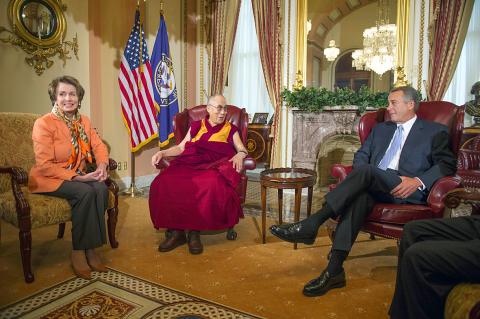The Dalai Lama on Thursday encouraged the US to show self-confidence in defending democracy as top lawmakers rallied behind his calls to preserve Tibetan culture.
Tibet’s exiled spiritual leader, whose meeting on Feb. 21 with US President Barack Obama was angrily condemned by China, returned to Washington where — for the first time — he delivered the customary prayer that opens each US Senate session.
The Dalai Lama later met congressional leaders and told them one of his main goals was “preservation of Tibetan culture.”

Photo: EPA
Offering advice as a “longtime friend” of the US, the Dalai Lama said that he considered the nation to be “really a champion of democracy, freedom.”
“These traditional values are, I think, very, very relevant in today’s world. After all, you are the leading nation in the free world, So, [show] self-confidence,” he said.
The Dalai Lama sat between US House of Representatives Speaker John Boehner, who said he wanted to show bipartisan support for the Buddhist monk, and the Republican leader’s often bitter rival Nancy Pelosi, a longtime activist on the Tibetan cause. He later met top senators.
“What is happening in Tibet is a challenge to the conscience of the world,” said Pelosi, the leader of Obama’s Democratic Party in the House of Representatives.
In contrast to his meeting with Obama, which the White House took pains to portray as private, the Dalai Lama was accompanied in his talks at Congress by Lobsang Sangay, who was elected in 2011 as the prime minister of Tibetans in exile.
The Dalai Lama told the lawmakers that he had transferred his political role to the elected leader. While the globe-trotting monk has been instrumental in throwing a worldwide spotlight on Tibet, the Nobel Peace Prize winner has increasingly been looking ahead to the future of the movement without him.
The Dalai Lama appeared to reflect on his own mortality as he served as the guest Senate chaplain. Offering prayers to the Buddha “and all other gods,” the Dalai Lama recited what he described as “my favorite prayer,” which he recites daily for inner strength.
Meanwhile, the Beijing government yesterday expressed anger over the meeting, urging the US to “stop conniving” with the man it brands a separatist working under the “cloak of religion.”
Chinese Ministry of Foreign Affairs spokesman Qin Gang (秦剛) said Beijing expressed “strong opposition and firm opposition” to the meeting and had “launched solemn representations with the US.”
“He is a political exile who has long been engaged in anti-Chinese separatist activities under the cloak of religion,” the spokesman told reporters at a regular briefing.
“China urges the US Congress to abide by its commitment of recognizing Tibet as a part of China, not supporting Tibetan independence, stop interfering in China’s domestic affairs with Tibet-related affairs, stop conniving and supporting the anti-China separatist activities by Tibetan independence forces,” Qin said.

INVESTIGATION: The case is the latest instance of a DPP figure being implicated in an espionage network accused of allegedly leaking information to Chinese intelligence Democratic Progressive Party (DPP) member Ho Jen-chieh (何仁傑) was detained and held incommunicado yesterday on suspicion of spying for China during his tenure as assistant to then-minister of foreign affairs Joseph Wu (吳釗燮). The Taipei District Prosecutors’ Office said Ho was implicated during its investigation into alleged spying activities by former Presidential Office consultant Wu Shang-yu (吳尚雨). Prosecutors said there is reason to believe Ho breached the National Security Act (國家安全法) by leaking classified Ministry of Foreign Affairs information to Chinese intelligence. Following interrogation, prosecutors petitioned the Taipei District Court to detain Ho, citing concerns over potential collusion or tampering of evidence. The

TRADE: The premier pledged safeguards on ‘Made in Taiwan’ labeling, anti-dumping measures and stricter export controls to strengthen its position in trade talks Products labeled “made in Taiwan” must be genuinely made in Taiwan, Premier Cho Jung-tai (卓榮泰) said yesterday, vowing to enforce strict safeguards against “origin laundering” and initiate anti-dumping investigations to prevent China dumping its products in Taiwan. Cho made the remarks in a discussion session with representatives from industries in Kaohsiung. In response to the US government’s recent announcement of “reciprocal” tariffs on its trading partners, President William Lai (賴清德) and Cho last week began a series of consultations with industry leaders nationwide to gather feedback and address concerns. Taiwanese and US officials held a videoconference on Friday evening to discuss the

NEGOTIATIONS: The US response to the countermeasures and plans Taiwan presented has been positive, including boosting procurement and investment, the president said Taiwan is included in the first group for trade negotiations with the US, President William Lai (賴清德) said yesterday, as he seeks to shield Taiwanese exporters from a 32 percent tariff. In Washington, US Trade Representative Jamieson Greer said in an interview on Fox News on Thursday that he would speak to his Taiwanese and Israeli counterparts yesterday about tariffs after holding a long discussion with the Vietnamese earlier. US President Donald Trump on Wednesday postponed punishing levies on multiple trade partners, including Taiwan, for three months after trillions of US dollars were wiped off global markets. He has maintained a 10 percent

PERSONAL DATA: The implicated KMT members allegedly compiled their petitions by copying names from party lists without the consent of the people concerned Judicial authorities searched six locations yesterday and questioned six people, including one elderly Chinese Nationalist Party (KMT) member and five KMT Youth League associates, about alleged signature forgery and fraud relating to their recall efforts against two Democratic Progressive Party (DPP) legislators. After launching a probe into alleged signature forgery and related fraud in the KMT’s recall effort, prosecutors received a number of complaints, including about one petition that had 1,748 signatures of voters whose family members said they had already passed away, and also voters who said they did not approve the use of their name, Taipei Deputy Chief Prosecutor